The HTC 10 Review
by Joshua Ho on September 19, 2016 8:00 AM ESTSystem Performance
One of the major areas worth discussing when it comes to mobile devices is computing performance. As much as OEMs try to not talk about this, ultimately what distinguishes a smartphone from a featurephone or simple flip phone is dramatically improved compute. Running a web browser, running a full Linux OS with apps that require JIT or AOT compilation are all tasks that demand large amounts of system memory and compute. Similarly, any kind of 3D game is going to require quite a bit of compute power and memory in general. As mentioned in previous reviews a major focus for this year has been trying to make our benchmarks more focused on real-world performance, so we’ll be better able to show how the HTC 10 actually performs relative to other devices on the market.
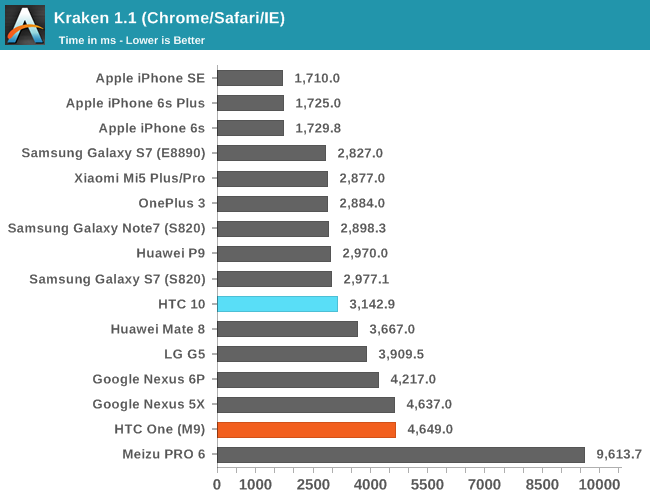
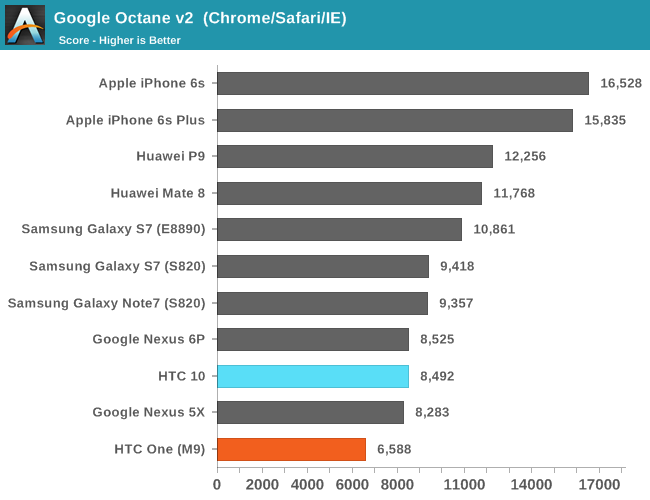
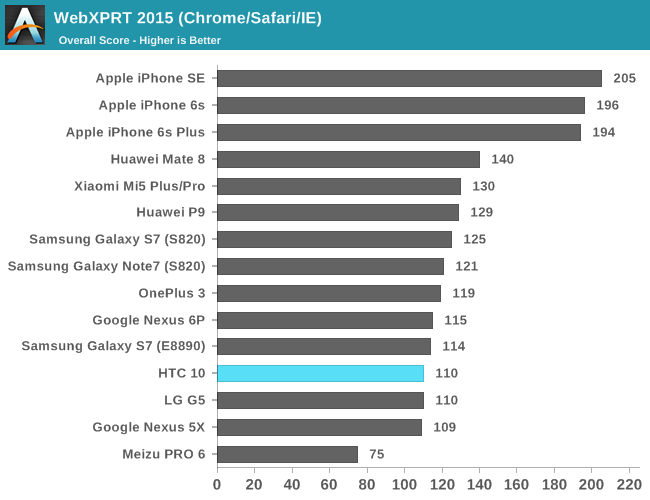
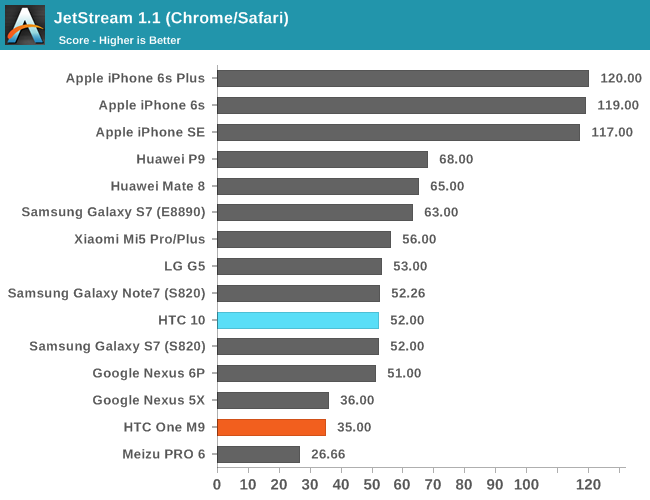
In the basic browser benchmarks, we can see that the HTC 10 is pretty much on par with all other Snapdragon 820 devices. This shouldn't really come as a surprise given how much of an optimization target all of these benchmarks are for the OEMs and SoC vendors, but performance in general on Snapdragon 820 is not necessarily great for web browsing with Chrome.
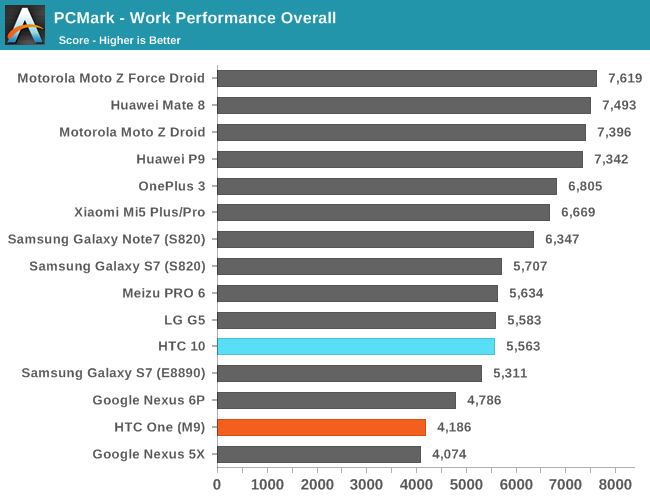
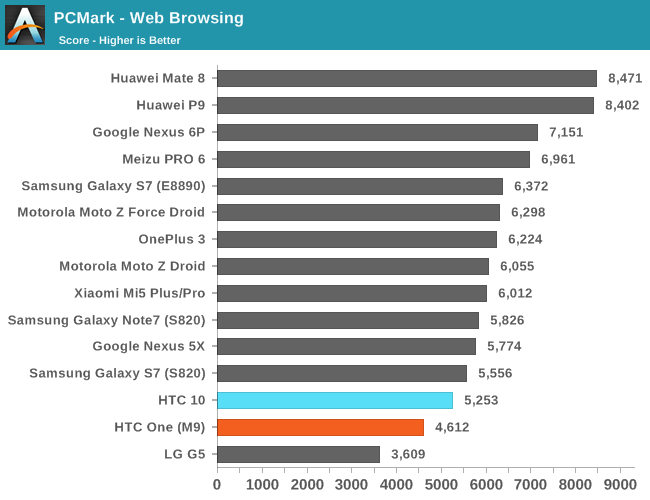
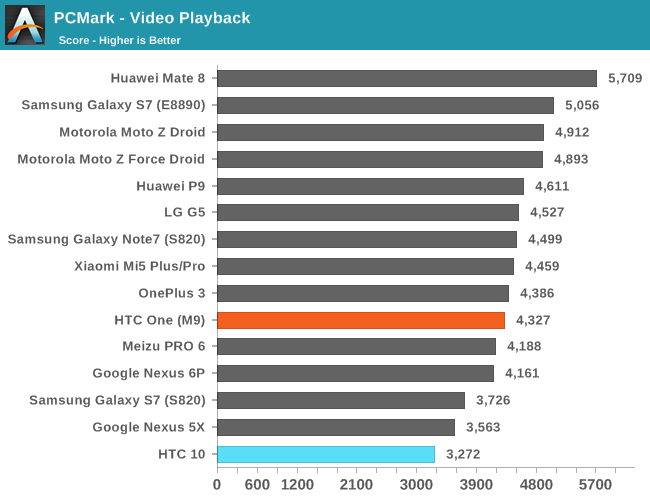
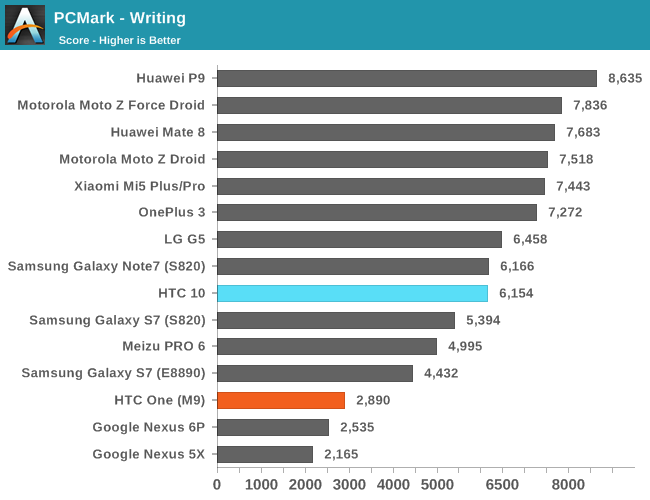
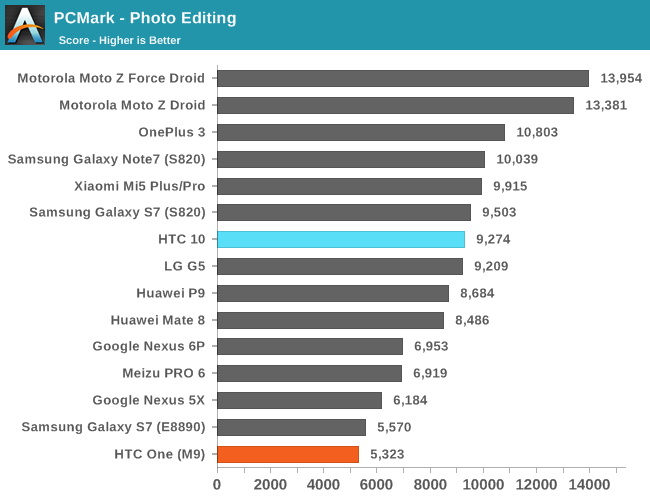
PCMark is very sensitive to DVFS changes in most cases so it's interesting to see how closely it performed to the Galaxy S7 and G5. What is notable here is the poor showing in video playback, which persists even if you use HTC's CPU cheats which are still accessible from the developer settings. The average scores that PCMark records is significantly higher than what I can achieve with the HTC 10 unless I enable high CPU performance mode. Determining what this means has been left as an exercise to the reader.
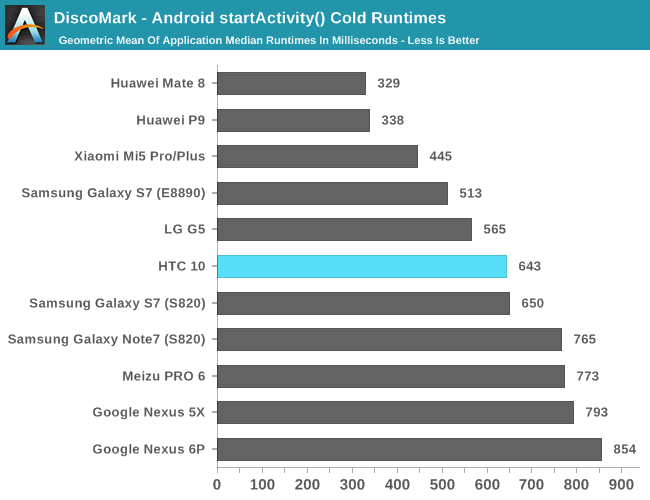
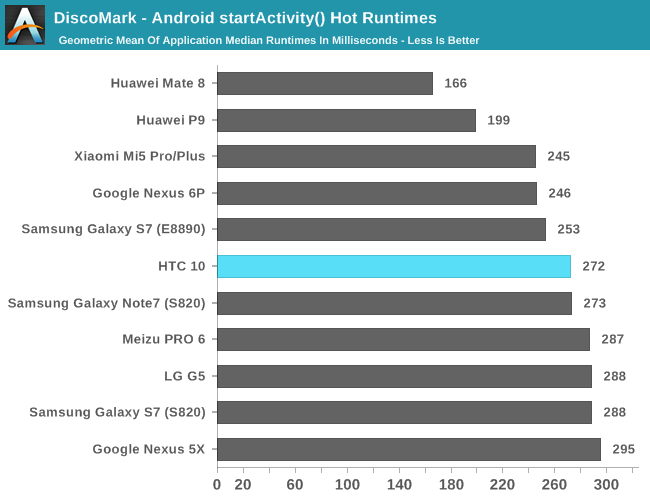
Looking at the HTC 10 overall results it might be tempting to simply suggest that overall performance is comparable to the Galaxy S7 with S820 but when you look at the individual breakdown the main reason why the HTC 10 seems to be so slow is because the location provider in Maps is causing its launch time to be significantly higher than most phones I've seen before. In just about every other situation the Galaxy S7 is significantly behind the HTC 10. Overall, I think the HTC 10 performance is in line with what I'd expect for a Snapdragon 820 phone here.










183 Comments
View All Comments
Samus - Monday, September 19, 2016 - link
The only worthwhile android device is a $100 android device like the Moto G Play or something. Why waste money on something that is going to lose all its value in a year to get virtually the same experience.I don't get the concept behind premium android devices. Just makes no sense. The most expensive one I've ever considered is perhaps the $300 OnePlus.
Murloc - Monday, September 19, 2016 - link
I guess taking decent pictures or playing 3D games.I don't do that, so I don't buy high end phones.
Murloc - Monday, September 19, 2016 - link
this isn't any different for iOS or WP devices btwphilehidiot - Tuesday, September 20, 2016 - link
I can absolutely see your point. But conversely my girlfriend bought a cheap Android phone and regretted it massively. Granted it was a crap one but she ended up using my 3 year old flagship device which still works brilliantly. The difference is that now she will use her phone for a lot more, including navigation (which destroyed the battery on the old device and couldn't keep up), youtube (useful for reference when doing something on the car or cooking and you don't have a laptop handy) as well as the much better camera. When previously she wouldn't have bothered using the smartphone camera she now does because a) it's not shite and b) the high quality screen means it's actually worth looking at and sharing photos on the phone. The other thing to remember is that the cameras on many a high end smartphone are approaching what you'd get in many compact cameras (albeit without optical zoom) according to Which? magazine here in the UK. Whilst this is debateable by photography nuts it does mean for the average Joe we get a decent enough camera in our pockets all the time. Not only does this mean you always have a decent camera but it means you don't have to buy one - the savings of which you can add to your device budget. You also have the added advantage of your photos being backed up to the cloud and so if your phone does get nicked then you still have the data. This is not something most stand alone cameras can do as they don't have a mobile data connection.I can see your point but when you have a high end phone and use it for a while it's unlikely you'll want to go back. Myself I go through two whole battery charges a day on my M9 (multiple factors but screen on time is the biggest) and that's simply because I use it for reference during work, emails, reading and editing presentations (try watching a powerpoint presentation with attached videos on a low end device), youtube and web browsing at lunch time and a massive mix of things in between including reading in the pub which isn't exactly pleasant after a while on a low end screen. The other advantage to a high end phone is it's more likely to be supported with security and OS updates throughout the product's lifespan. Partly because it has the power to run the newer features (like split screen multitasking - something I'm looking forward to) and partly because that's what the extra profit margin paid towards. You'll also find that, as software is developed based on the average specs out in the wild, as the average phone spec rises you'll be left behind - this means that applications are updated (mandatorily), you'll often find them slowing down over time as they are aiming for higher and higher specifications over the couple of years you own the device.
Whilst there are some damned good low-mid range Android phones out there, I feel that they are ultimately let down by screen, camera, R&D and long term support. I use my phone to such an extent that it's worth every penny to get something that works properly.
Sorry for the long post but I thought you made such a good point about lower end devices that you deserved someone who does invest in a high end model justifying their reasons why.
darkich - Tuesday, September 27, 2016 - link
^ great post, with which I agree completely, aside from the part about understanding the point to which you replied to.I really doubt Samus has used a true high end Android device enough to warrant an credible opinion.
And he's obviously missing the whole world-changing paradigm of computing that's happening before his eyes.
I suggest him to go read the first and last paragraphs of the Note 7 review on the Verge..that guy simply nailed it.
And that's exactly why myself, after using a Note 3 for three years as my main computer, camera, media and gaming device (still serves me amazingly well but the physical wear and tear started to show, the camera and GPU have become outdated, as well as the battery endurance), am now left waiting for the Note 7 re-release.
There's just no alternative for me.
londedoganet - Monday, September 19, 2016 - link
Oh, is that why every second comment on any article is "where's the HTC 10 review, Anandtech has sold its soul and become Apple shills, even Anand has gone to work for Apple"?jfallen - Monday, September 19, 2016 - link
All this in-depth review of the display but not once did you care to look at it though a set of polarized glasses...If you did you'll note that they polarized the display so that the screen appears black when holding the phone in the normal up-right position while wearing polarized sunnies... UNFORGIVABLE!!! design decision and that's why I don't one.
Still rocking the HTC ONE M7 with it's unpolarised screen, MHC and dual front speakers. The original and still the best ;)
ToTTenTranz - Monday, September 19, 2016 - link
I suffer from this issue with my HTC Butterfly 3 (exclusive japanese model that is pretty much what the M9 should've been), which seems to have this very same 5.2" 1440p screen.I have to say it really bothers me having to hold the phone in landscape if I'm wearing my polarized Oakleys.
Demi9OD - Monday, September 19, 2016 - link
I use a matte screen protector and don't have any problems.ChronoReverse - Monday, September 19, 2016 - link
After I put on my TGSP (Orzly), the polarization issue was resolved for mine (Tianma panel)